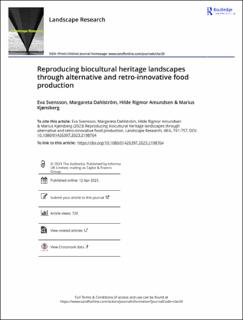Reproducing biocultural heritage landscapes through alternative and retro-innovative food production
Peer reviewed, Journal article
Published version
Permanent lenke
https://hdl.handle.net/11250/3119917Utgivelsesdato
2023Metadata
Vis full innførselSamlinger
Sammendrag
Landscapes rich in biocultural heritage are declining en masse across Europe. This is due to the effects of countryside depopulation and to large-scale, industrial agriculture. Landscape heritage and its associated biodiversity largely depend on pre-industrial agrarian management. Because authoritative conservation cares only for minor, more spectacular, landscape segments, other forms of everyday management of the more mundane biocultural heritage are needed. Herein, innovative, alternative food producers (i.e. environmentally and animal-friendly farmers) are investigated as potential stewards of biocultural heritage. The results show that alternative food producers contribute to new ways of reproducing the biocultural heritage, albeit with greater emphasis on its ‘green’ side (e.g. biodiversity) than that of cultural heritage. They also face numerous challenges that threaten their businesses.

